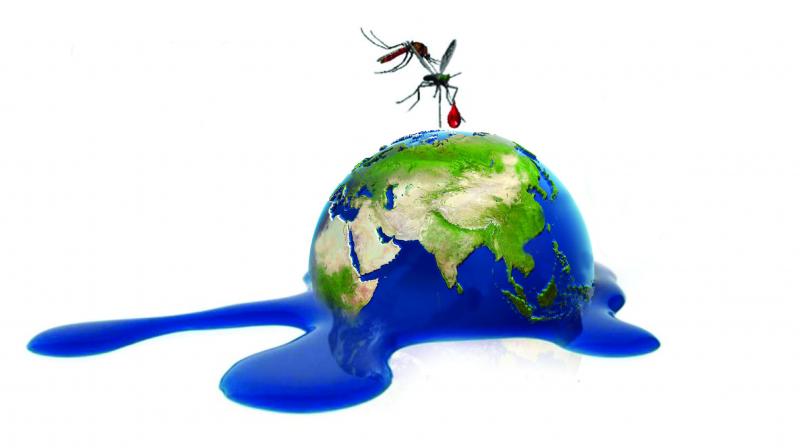Climate change alters disease pattern
Temperature and humidity strongly affect vector cycles, leading to large production of viruses.

Hyderabad: The climate change is affecting bacteria, virus, pathogens and parasites due to which the transmission of diseases through water, insects and other cold blooded animals has increased. Global warming changes the movement of vectors and pathogens, with diseases cropping up in newer locations and in different seasons. The vector life cycle is strongly influenced by temperatures and humidity. A high temperature and humidity shorten the development of vectors, leading to larger production of bacteria or virus. The alterations in the vector cycle have shown a sharp increase in malaria cases, senior consultant physician Dr Sudarshan Reddy L. explained.
“The increasing cases of vector-borne diseases show that mosquitoes are sensitive to the climate change and humans will be exposed to the danger of diseases caused by mosquitoes. The most vulnerable are infants, children, elderly and people with co morbidities like diabetes, hypertension and cardiovascular diseases,” Dr Sudarshan Reddy said. Researchers studying the effect of the climate change, found that there are additional deaths per year due to diseases caused by the climate change.
Diseases like malaria, diarrhoea, heat stress and malnutrition are common now. Dr J. Anish Anand, consultant, internal medicine, said, “The micro-organisms undergo genetic changes due to the climate change. They do not respond to the normal medicines. We are also seeing the growth of new and rare micro-organisms. This is becoming a major challenge as these are spreading in communities.”
Heat is contributing to the heat stress, raising ozone levels and other pollutants in the air, causing respiratory and cardiovascular diseases. Pollen and other aeroallergen levels have seen a rise due to the extreme heat, triggering asthma attacks. The erratic behaviour of the weather, seen in extreme heat and extreme rain, is causing not only human destruction but also disturbing the habitat.
Floods contaminate freshwater supplies and heighten the risk of water-borne diseases. They are breeding grounds for mosquitoes and also snails, insects and other cold blooded animals. There has been an increase of contamination of food and water by E-coli salmonella, ringworms, giardiasis due to erratic weather conditions. “The overall health effects of changing climate are overwhelmingly negative,” Dr Anand said. The only way to fight the diseases caused by changes in the climate is to try and prevent them. Opt for clean drinking water, hygienic food and regular and appropriate vaccination. Keep surroundings clean, and remove reservoirs of stagnant water.
A villain called vibrio bacterium:
Vibrio bacterium, the pathogen responsible for diarrohoeal diseases, is usually found in warm marine waters. It can also be found in raw oysters which, when eaten, can cause bloodstream poisoning. This bacterium is found to expand its range due to warming of coastal waters. This is in addition to the increasing temperatures and changes in precipitation patterns. The chances for transmitting this bacterium to humans in high.
Explaining this, Dr S. Shanker, general physician, said, “Intense rainfall and flooding introduces feacal contaminants in recreational water and drinking water, causing a hazard to human health. It is becoming important that during these erratic changes the precautions are doubled both by individual and also the state. The threat of cholera and typhoid rises in these conditions.”
The biggest challenge faced is that the public health system and infrastructure are not equipped to manage the rising risks of climate change. A senior doctor on condition of anonymity said, “To adapt to climate change it is important to understand that there is a need for proper drainage system to be in place to prevent stagnation of water.” He said, “Plantation of more trees in the urban areas, vector control measures and desalinisation are important. Appropriate and accurate weather forecasts are a must so that the society is prepared to the deal with the hazards of the climate change.”

